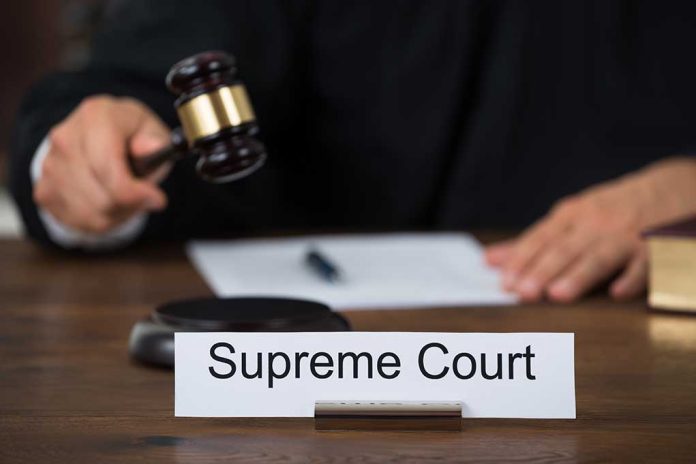
In a major victory for American sovereignty, the Supreme Court has cleared the way for President Trump’s administration to swiftly deport illegal migrants to third countries without lengthy procedural delays that have hampered border enforcement.
Key Takeaways
- The Supreme Court ruled 6-3 to allow Trump’s administration to resume deportations to third countries without additional due process requirements.
- The decision overturns a lower court ruling that had imposed “onerous” procedural requirements on immigration authorities.
- Liberal Justices Sotomayor, Kagan, and Jackson issued sharp dissents, with Sotomayor calling the decision “a gross abuse of the Court’s equitable discretion.”
- The ruling enables expedited removals to countries including South Sudan, El Salvador, Guatemala, and Libya as part of Trump’s border security strategy.
- Department of Homeland Security officials praised the decision as essential for maintaining American safety and security.
Supreme Court Restores Presidential Authority on Border Security
The Supreme Court has delivered a significant win for the Trump administration’s immigration enforcement efforts, ruling 6-3 to allow deportations to third countries without additional procedural hurdles. The conservative majority on the Court lifted a lower court injunction that had required immigration authorities to provide migrants with advance notice and opportunities to contest their removal to countries not specified in their original deportation orders. This decision effectively reinstates a key component of President Trump’s strategy to secure America’s borders and expedite the removal of illegal aliens.
The ruling overturns U.S. District Judge Brian Murphy’s previous order that had required the administration to keep migrants in U.S. custody until they could have a “reasonable fear interview.” The Trump administration had argued that these court-imposed restrictions were hampering national security efforts by blocking the removal of potentially dangerous illegal aliens. White House officials have consistently maintained that illegal immigrants are not entitled to the same due process protections as American citizens, particularly when their presence poses risks to public safety.
Liberal Justices Issue Scathing Dissent
The Court’s three liberal justices – Sonia Sotomayor, Elena Kagan, and Ketanji Brown Jackson – strongly opposed the decision, with Justice Sotomayor writing a particularly pointed dissent. She accused the Court’s majority of improperly intervening in a complex case that lower courts were still carefully evaluating. Her dissent highlighted concerns about fundamental due process protections being stripped away from vulnerable individuals who may face dangerous conditions in third countries without a proper evaluation of their circumstances.
“Rather than allowing our lower court colleagues to manage this high-stakes litigation with the care and attention it requires, this Court now intervenes to grant the Government emergency relief from an order it has repeatedly defied,” said Justice Sotomayor
Sotomayor further emphasized the importance of due process as a foundational American principle, stating: “The Due Process Clause represents ‘the principle that ours is a government of laws, not of men, and that we submit ourselves to rulers only if under rules.'” This fundamental disagreement over constitutional protections for non-citizens underscores the ideological divide within the Court on immigration enforcement matters and the appropriate balance between national security concerns and procedural safeguards.
Real-World Impact on Border Security
The Supreme Court’s decision represents a practical approach to addressing the ongoing border crisis by enabling immigration authorities to expedite deportations without being hampered by procedural requirements that slow the process. The case specifically involved migrants who were being deported to countries such as South Sudan, El Salvador, Costa Rica, and Guatemala – nations that have agreements with the United States to accept deportees who may not be citizens of those countries. This “third country” deportation strategy is a key component of Trump’s border management approach.
“The ramifications of the Supreme Court’s order will be horrifying; it strips away critical due process protections that have been protecting our class members from torture and death,” said Trina Realmuto
Department of Homeland Security officials have praised the Court’s decision as a win for American safety and security. The ruling allows the administration to continue implementing its immigration policies designed to deter illegal border crossings and quickly remove those who enter the country unlawfully. While immigrant advocacy groups have vowed to continue challenging the policy, the Supreme Court’s decision provides the administration with legal backing to proceed with its enforcement strategy while the broader case continues through the court system.
A Victory for Immigration Enforcement
This ruling represents a significant victory for the Trump administration’s broader immigration agenda, which prioritizes swift enforcement actions and deterrence. By allowing deportations to third countries without additional procedural requirements, the Court has effectively recognized the executive branch’s authority to manage immigration enforcement efficiently. The decision aligns with President Trump’s commitment to addressing the border crisis through decisive action rather than prolonged legal processes that often result in extended detentions or releases into the United States.
While critics claim the policy raises humanitarian concerns, supporters point out that the primary responsibility of the U.S. government is to protect American citizens and uphold the rule of law. The Supreme Court’s ruling reinforces the principle that illegal entry into the United States does not automatically confer the full range of legal protections and procedural rights that citizens enjoy. As the litigation continues in lower courts, this decision enables the administration to maintain border security measures without judicial interference that hampers enforcement efforts.



